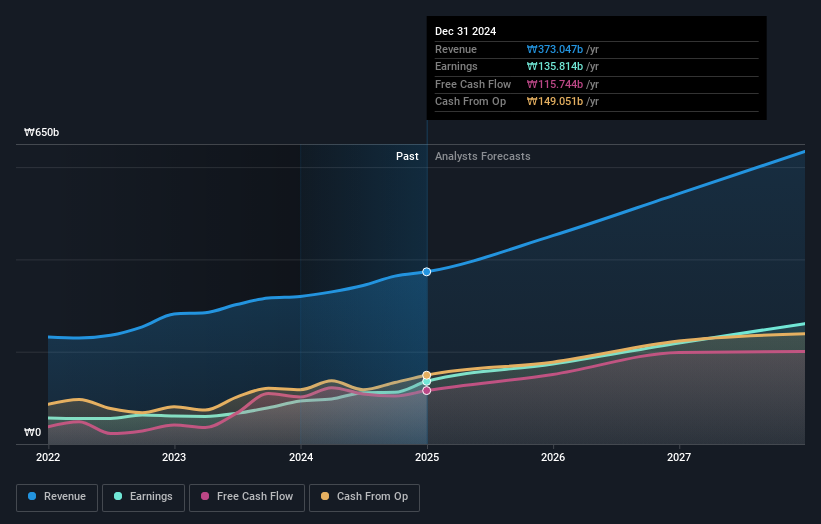- South Korea
- /
- Biotech
- /
- KOSDAQ:A145020
Private companies in Hugel, Inc. (KOSDAQ:145020) are its biggest bettors, and their bets paid off as stock gained 3.3% last week

Key Insights
- The considerable ownership by private companies in Hugel indicates that they collectively have a greater say in management and business strategy
- 56% of the business is held by the top 2 shareholders
- Institutional ownership in Hugel is 22%
A look at the shareholders of Hugel, Inc. (KOSDAQ:145020) can tell us which group is most powerful. With 50% stake, private companies possess the maximum shares in the company. Put another way, the group faces the maximum upside potential (or downside risk).
As a result, private companies collectively scored the highest last week as the company hit ₩4.0t market cap following a 3.3% gain in the stock.
Let's delve deeper into each type of owner of Hugel, beginning with the chart below.
See our latest analysis for Hugel

What Does The Institutional Ownership Tell Us About Hugel?
Institutional investors commonly compare their own returns to the returns of a commonly followed index. So they generally do consider buying larger companies that are included in the relevant benchmark index.
We can see that Hugel does have institutional investors; and they hold a good portion of the company's stock. This implies the analysts working for those institutions have looked at the stock and they like it. But just like anyone else, they could be wrong. If multiple institutions change their view on a stock at the same time, you could see the share price drop fast. It's therefore worth looking at Hugel's earnings history below. Of course, the future is what really matters.

We note that hedge funds don't have a meaningful investment in Hugel. The company's largest shareholder is Aphrodite Acquisition Holdings LLC, with ownership of 50%. In comparison, the second and third largest shareholders hold about 6.7% and 2.0% of the stock.
To make our study more interesting, we found that the top 2 shareholders have a majority ownership in the company, meaning that they are powerful enough to influence the decisions of the company.
While studying institutional ownership for a company can add value to your research, it is also a good practice to research analyst recommendations to get a deeper understand of a stock's expected performance. There are plenty of analysts covering the stock, so it might be worth seeing what they are forecasting, too.
Insider Ownership Of Hugel
The definition of company insiders can be subjective and does vary between jurisdictions. Our data reflects individual insiders, capturing board members at the very least. Company management run the business, but the CEO will answer to the board, even if he or she is a member of it.
Insider ownership is positive when it signals leadership are thinking like the true owners of the company. However, high insider ownership can also give immense power to a small group within the company. This can be negative in some circumstances.
Our data cannot confirm that board members are holding shares personally. Given we are not picking up on insider ownership, we may have missing data. Therefore, it would be interesting to assess the CEO compensation and tenure, here.
General Public Ownership
With a 29% ownership, the general public, mostly comprising of individual investors, have some degree of sway over Hugel. This size of ownership, while considerable, may not be enough to change company policy if the decision is not in sync with other large shareholders.
Private Company Ownership
We can see that Private Companies own 50%, of the shares on issue. It might be worth looking deeper into this. If related parties, such as insiders, have an interest in one of these private companies, that should be disclosed in the annual report. Private companies may also have a strategic interest in the company.
Next Steps:
It's always worth thinking about the different groups who own shares in a company. But to understand Hugel better, we need to consider many other factors.
I like to dive deeper into how a company has performed in the past. You can find historic revenue and earnings in this detailed graph.
If you are like me, you may want to think about whether this company will grow or shrink. Luckily, you can check this free report showing analyst forecasts for its future.
NB: Figures in this article are calculated using data from the last twelve months, which refer to the 12-month period ending on the last date of the month the financial statement is dated. This may not be consistent with full year annual report figures.
Valuation is complex, but we're here to simplify it.
Discover if Hugel might be undervalued or overvalued with our detailed analysis, featuring fair value estimates, potential risks, dividends, insider trades, and its financial condition.
Access Free AnalysisHave feedback on this article? Concerned about the content? Get in touch with us directly. Alternatively, email editorial-team (at) simplywallst.com.
This article by Simply Wall St is general in nature. We provide commentary based on historical data and analyst forecasts only using an unbiased methodology and our articles are not intended to be financial advice. It does not constitute a recommendation to buy or sell any stock, and does not take account of your objectives, or your financial situation. We aim to bring you long-term focused analysis driven by fundamental data. Note that our analysis may not factor in the latest price-sensitive company announcements or qualitative material. Simply Wall St has no position in any stocks mentioned.
About KOSDAQ:A145020
Hugel
Develops and manufactures biopharmaceuticals in South Korea and internationally.
Flawless balance sheet with solid track record.
Similar Companies
Market Insights
Community Narratives



